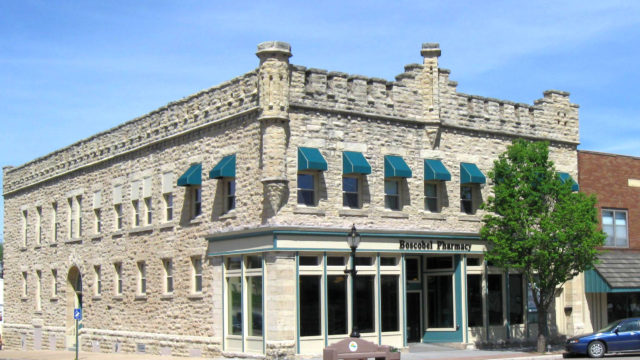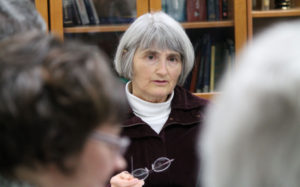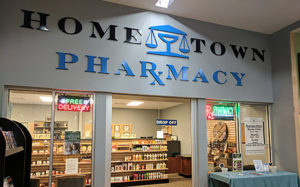
Three more innovative community pharmacies partner with the School to welcome residents, jump-start careers
By Katie Gerhards
A community pharmacy is much more than shelves of prescriptions and a countertop. It’s a place where pharmacists forge relationships with their patients, monitor their progress, and work to improve adherence. It’s a place for people to learn more about their disease state and their treatments. And in some cases, community pharmacies are also places to receive mental health counseling and treatment, educational classes, and other cutting-edge services.
These inventive practices are the community pharmacies partnering with the University of Wisconsin–Madison School of Pharmacy’s Community Pharmacy Residency program. And their numbers are growing: The School is adding three new residency sites for the 2018–19 residency year, for a total of five.
“We’re collaborating with some very innovative sites who have been advancing the practice of pharmacy and patient care services, and they’re utilizing our residents to continue to create new services,” says Mara Kieser, assistant dean of experiential education and professor in the School’s Pharmacy Practice Division.
Beaver Dam Hometown Pharmacy, Boscobel Pharmacy, and the Milwaukee-based Hayat Pharmacy are joining The Medicine Shoppe Pharmacy in Two Rivers and Streu’s Pharmacy Bay Natural in Green Bay as hosts for UW–Madison School of Pharmacy’s post-graduate trainees.
Residents support innovative practices
Recently graduated pharmacists aren’t the only ones who benefit from residency programs—the hosting pharmacy, pharmacist preceptors (supervising pharmacists), the School, and patients all benefit from the important work done by residents.
“We’re collaborating with some very innovative sites who have been advancing the practice of pharmacy and patient care services.”
–Mara Kieser
The School’s number of residency sites is dynamic because pharmacies tend to welcome residents when they have a particular need. For example, Indian Health Services partnered with the School’s residency program to develop anticoagulation and asthma clinics, and SSM Health brought pharmacy residents aboard while they were evolving their care model to include more primary care pharmacists.
By leveraging the time and talents of residents, pharmacies gain a fresh viewpoint and can expand their services to better serve their patients. The School’s newest sites have already implemented some novel services, which will soon be further amplified with a resident on hand.
Boscobel Pharmacy, as the only pharmacy in that area, offers hospice care, comprehensive medication reviews, and other health and wellness services that promote medication adherence. “We’re excited to share our practice and the opportunities available in rural community pharmacy with motivated resident pharmacists,” says preceptor Michelle Farrell (BS ’99, PharmD ’00). “We have a number of project management activities we look forward to expanding, and we’re looking forward to the energy a UW–Madison School of Pharmacy resident will bring to our pharmacy.”

Beaver Dam Hometown Pharmacy, with pharmacist preceptor Abbigail Linde (PharmD ’11), is embracing pharmacists’ recently extended role to administer non-vaccine medication injections. In Linde’s pharmacy, patients can have a virtual visit with their mental health provider right within the pharmacy, and then the pharmacist and provider discuss the recommended medication and dosage, and then Linde delivers the medication, whether it’s a capsule or an injection of an anti-psychotic drug.
“Building an office visit and medication adherence into one trip is pretty effective and innovative,” says Kieser. “Those are the kinds of services that impact patients’ lives in a big way.”
Hayat Pharmacy, which has more than 10 locations around the Milwaukee area, goes the extra mile to take care of their underserved patients—literally—and takes pharmacy services to them, whether it’s at their home, in a church, a senior center, or a physician’s clinic.
Preceptor Dimmy Sokhal (PharmD ’13), who completed both her PharmD and residency through the UW–Madison School of Pharmacy, sees patients so regularly in doctors’ clinics that she has space in their clinic.
Residencies enhance pharmacists’ skills
Nearly half of the School of Pharmacy’s PharmD students pursue residencies after graduation, and through exceptional training and forward-thinking programs like the Advanced Pharmacy Practice Experiences – Residency Track, the School has built a strong record of residency match rates. In 2018, the UW–Madison School of Pharmacy had an 88 percent match rate—the fifth highest in the nation.
The School started its own residency program in 2003, when three independent pharmacies—including The Medicine Shoppe—approached the School of Pharmacy about building a partnership, and by 2019, the program will have helped launch 44 pharmacists’ careers.
“We’re excited to share our practice and the opportunities available in rural community pharmacy with motivated resident pharmacists.”
–Michelle Farrell
Unlike large health systems, community pharmacies are often independent and have limited resources to promote residencies. Through a partnership with the School, community pharmacies can attract high-quality candidates to design and implement important improvement projects, while the School works with the residents to provide scholarly support.
The UW–Madison School of Pharmacy’s community pharmacy residents sharpen their communication skills by teaching in the pharmacotherapy lab, and they work with the School’s faculty to learn the business model of their pharmacy, create a business plan with potential new services, and frame their project with a hypothesis, method, and final results. At the end of their year, the residents distill their project’s results into a manuscript, poster, and oral presentation.
Because of the intensive hands-on experience paired with ongoing learning and an implementation project, residencies give pharmacists a leg up when it comes to climbing the career ladder, packing years of accumulated expertise into 2,000 hours in just 12 months.

In addition to helping pharmacists advance in their practice, residencies are also required for many faculty and advanced positions in hospital or ambulatory care pharmacy.
For Andrew Saether, a community pharmacy residency was also an opportunity to design his future job. As a resident at Streu’s Pharmacy Bay Natural, Saether was working on a new transitions of care program for patients discharged from skilled nursing facilities.
“I was excited about the transitions of care program and getting the opportunity to work with patients one-on-one,” says Saether. In addition to the new transitions of care program, Streu’s Pharmacy also has a nurse on staff, a classroom for community members to learn more about disease state management, and many herbal products.
As his UW–Madison residency program nears its end, Saether has something else to look forward to: He was recently offered a permanent position as Streu’s transitions of care pharmacist. “He designed his own job—he got his dream job. That’s pretty cool,” says Kieser.
Customized career boosters
“Doing community residencies can be a tool to advance their career,” says Kieser. With the pharmacists’ goals in mind, the residencies can be tweaked to hit on particular skills residents are hoping to gain. For pharmacists who aspire to become faculty or preceptors, the School also offers a teaching certificate in conjunction with the residency.
“We’ll teach them how to teach,” says Kieser. “We want to create well-trained community pharmacists who could then precept and train our students, and perhaps they will then later join our program as a resident preceptor.”
That’s what we’ve done best—we’ve helped pharmacists hit their career goals, and that’s rewarding to see. –Mara Kieser
Some of those ties already exist—in fact, all but one of the School’s seven community pharmacy resident preceptors are UW–Madison School of Pharmacy alumni, including Nicole Schreiner (BS ’97, PharmD ’98) at Streu’s Pharmacy, and Marvin Moore (PharmD ’02) and Brian Jensen (BS ’80) at Medicine Shoppe Pharmacies.
The School’s residents have gone on to become teachers, managers, and owners of family and ambulatory care practices. “It’s a neat thing to see our residents grow and have these kinds of options,” says Kieser.
“As long as student pharmacists know what their goals are, our residencies can help them get there, with extra supervision and extra training. That’s what we’ve done best—we’ve helped pharmacists hit their career goals, and that’s rewarding to see.”
Learn more about the UW–Madison School of Pharmacy’s Community Pharmacy Residency program for pharmacists and the Residency-Track Advanced Pharmacy Practice Experience for PharmD students.